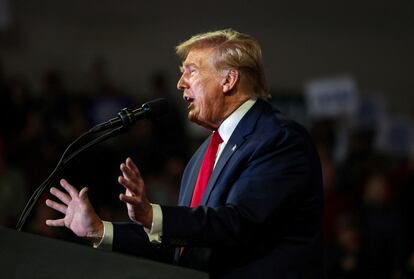Trump says he warned NATO ally: Spend more on defense or Russia can ‘do whatever the hell they want’
The former president’s comments Saturday were a ramping up of attacks on foreign aid and longstanding international alliances

Republican front-runner Donald Trump said Saturday that, as president, he warned NATO allies that he “would encourage” Russia “to do whatever the hell they want” to countries that are “delinquent” as he ramped up his attacks on foreign aid and longstanding international alliances.
Speaking at a rally in Conway, South Carolina, Trump recounted a story he has told before about an unidentified NATO member who confronted him over his threat not to defend members who fail to meet the trans-Atlantic alliance’s defense spending targets.
But this time, Trump went further, saying had told the member that he would, in fact, “encourage” Russia to do as it wishes in that case.
“‘You didn’t pay? You’re delinquent?’” Trump recounted saying. “‘No, I would not protect you. In fact, I would encourage them to do whatever the hell they want. You gotta pay. You gotta pay your bills.’”
NATO allies agreed in 2014, after Russia annexed Ukraine’s Crimean Peninsula, to halt the spending cuts they had made after the Cold War and move toward spending 2% of their GDPs on defense by 2024.
White House spokesperson Andrew Bates responded, saying that: “Encouraging invasions of our closest allies by murderous regimes is appalling and unhinged — and it endangers American national security, global stability, and our economy at home.”
Trump’s comments come as Ukraine remains mired in its efforts to stave off Russia’s 2022 invasion and as Republicans in Congress have become increasingly skeptical of providing additional aid money to the country as it struggles with stalled counteroffensives and weapons shortfalls.
They also come as Trump and his team are increasingly confident he will lock up the nomination in the coming weeks following commanding victories in the first votes of the 2024 Republican nominating calendar.
Earlier Saturday, Trump called for the end of foreign aid “WITHOUT “STRINGS” ATTACHED,” arguing that the U.S. should dramatically curtail the way it provides money.
“FROM THIS POINT FORWARD, ARE YOU LISTENING U.S. SENATE(?), NO MONEY IN THE FORM OF FOREIGN AID SHOULD BE GIVEN TO ANY COUNTRY UNLESS IT IS DONE AS A LOAN, NOT JUST A GIVEAWAY,” Trump wrote on his social media network in all-caps letters.
Trump went on to say the money could be loaned “ON EXTRAORDINARILY GOOD TERMS,” with no interest and no date for repayment. But he said that, “IF THE COUNTRY WE ARE HELPING EVER TURNS AGAINST US, OR STRIKES IT RICH SOMETIME IN THE FUTURE, THE LOAN WILL BE PAID OFF AND THE MONEY RETURNED TO THE UNITED STATES.”
During his 2016 campaign, Trump alarmed Western allies by warning that the United States, under his leadership, might abandon its NATO treaty commitments and only come to the defense of countries that meet the alliance’s guidelines by committing 2 percent of their gross domestic products to military spending.
Trump, as president, eventually endorsed NATO’s Article 5 mutual defense clause, which states that an armed attack against one or more of its members shall be considered an attack against all members. But he often depicted NATO allies as leeches on the U.S. military and openly questioned the value of the military alliance that has defined American foreign policy for decades.
As of 2022, NATO reported that seven of what are now 31 NATO member countries were meeting that obligation — up from three in 2014. Russia’s 2022 invasion of Ukraine has spurred additional military spending by some NATO members.
Trump has often tried to take credit for that increase, and bragged again Saturday that, as a result of his threats, “hundreds of billions of dollars came into NATO” — even though countries do not pay NATO directly.
Sign up for our weekly newsletter to get more English-language news coverage from EL PAÍS USA Edition
Tu suscripción se está usando en otro dispositivo
¿Quieres añadir otro usuario a tu suscripción?
Si continúas leyendo en este dispositivo, no se podrá leer en el otro.
FlechaTu suscripción se está usando en otro dispositivo y solo puedes acceder a EL PAÍS desde un dispositivo a la vez.
Si quieres compartir tu cuenta, cambia tu suscripción a la modalidad Premium, así podrás añadir otro usuario. Cada uno accederá con su propia cuenta de email, lo que os permitirá personalizar vuestra experiencia en EL PAÍS.
¿Tienes una suscripción de empresa? Accede aquí para contratar más cuentas.
En el caso de no saber quién está usando tu cuenta, te recomendamos cambiar tu contraseña aquí.
Si decides continuar compartiendo tu cuenta, este mensaje se mostrará en tu dispositivo y en el de la otra persona que está usando tu cuenta de forma indefinida, afectando a tu experiencia de lectura. Puedes consultar aquí los términos y condiciones de la suscripción digital.








































